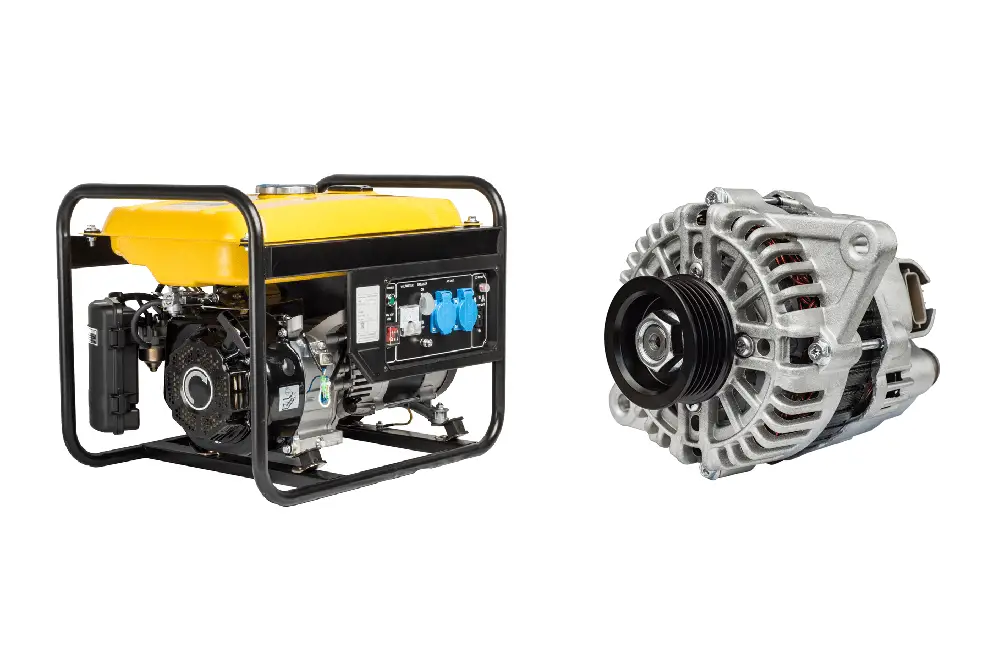When it comes to generating electricity, it is useful to know the differences between a generator and an alternator. Both a generator and an alternator can provide AC. Given this, it can often be confusing to know one from the other.
Often people can mistake a generator and an alternator as the same thing when in reality, they have some significant differences.
In this article, we will be talking you through what a generator is and what an alternator is. We will be discussing what both are used for and the differences between the two.

Table of Contents
What Is A Generator?
You may be familiar with a generator being used when there is a power shortage. Whether that is due to electrical issues or a storm, a backup or portable generator can be useful to have.
A generator creates electricity by converting mechanical energy into electrical energy. The mechanical energy enters the source and the generator then outputs it as electrical energy.
Generators are not responsible for creating electricity, they simply change energy from mechanical that cannot be used into electrical energy. It does this by moving the electrical charges.
A generator can produce both AC and DC, which is useful. Inside the generator, there is an electric motor which is surrounded by a series of coils. IT is these coils that rotate and transfer and build up the energy.
Generators are a great option if you need to provide a good amount of energy. They can power appliances with ease, and have the ability to produce a constant supply of AC and DC electricity. This is why they are used for longer periods as they are a reliable source of power.
What Is AC Electricity?
AC is short for alternating current. This current of electricity is what you will likely be most familiar with. AC is what is mainly used in the home.
As it is an alternating current, the direction flow of the electricity does change every so often. The majority of household appliances will use this form of electricity.
What Is DC Electricity?
DC is short for direct current. This current only flows in one direction. Unlike the alternating current, it is unable to flow in both directions. The most common use for direct current is the current that flows from a battery.
The chemical energy that is stored in the battery is converted into electric energy to power different electrical, but it does not then flow back into the battery. The flow of energy instead travels in one direction creating a circuit, flowing through the negative and positive charges in the battery.
What Is An Alternator?
On the surface, an alternator does seem similar to a generator. Like a generator, an alternator uses mechanical energy and turns it into electrical energy.
While a generator is used to power the alternator is typically used to power a car battery. The alternator provides an AC.
An alternator is a great source of electricity because it will only power as much electricity that is needed. For example, if the battery in your car is running low, the alternator will kickstart to recharge the battery. Once the battery is sufficiently charged, it will turn itself off again.
If your car battery dies after it has been charged by the alternator, this is usually a sign that the alternator is faulty as it is not running as it should.
It is important to remember that an alternator can only charge a battery that still contains some charge. It will not charge a battery that is dead. If you try to do this it can be quite dangerous.
What Are The Differences Between A Generator And An Alternator?
While you may already have seen some of the differences between a generator and an alternator in the previous sections, we will now discuss them in more detail.
Currents
The main difference between the two is the currents that they use. While a generator can provide both AC and DC currents, an alternator can only provide AC.
Dead Batteries
Another big difference between a generator and an alternator is how they charge batteries. While they are both able to charge batteries, only a generator can charge and bring back power to a dead battery. It is completely safe for a generator to do this.
However, if you try to charge a dead battery with an alternator, this is very dangerous. It can be fatal and can even cause fires.
Energy Use
A generator is capable of supplying a constant supply of energy, even when this energy is not needed. While this is great if you need to power something for a long period, it is not so great for energy usage and the environment.
In contrast to this, an alternator only uses energy as and when it needs to. It will not supply power that is not needed and switches off when it is not in use. Given this, it is far more energy-efficient overall. However, if you need a consistent supply of power, it is not the best option.
Typically, alternators are only used to supply power to small electricals. This is why they are often featured as a backup to charge a car’s battery. As a generator is capable of providing far more power than an alternator, it is the best choice if you need to provide a lot of power.
Summary
We hope that you found this article useful. As you can see, while alternators and generators are both capable of producing the same alternating current, they have very significant differences.
Alternators are great for short term use on a small scale, and generators are great at providing consistent power over long periods. Generators can provide power to both small and large electricals.
In addition to this generators are also capable of charging dead batteries, where alternators cannot. Generators can provide both a direct current and an alternating current, but alternators are only capable of providing an AC.
